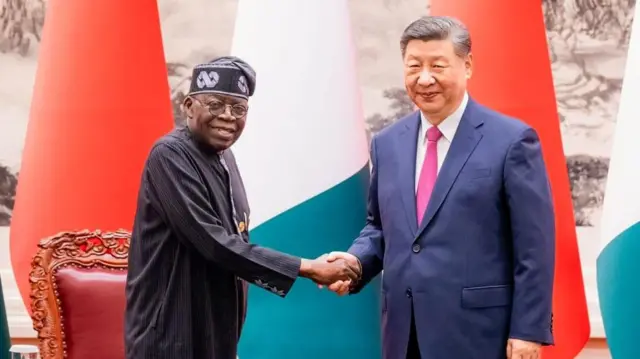As a recipient of the China-Nigeria Friendship Award and a citizen of the latter, it is quite natural to be exceptionally interested in the growing relationship between the two countries. The romance between Nigeria and China is a reality that has already generated the utmost curiosity.
Although Nigeria is not the only African country that is strengthening ties with China as the attendance at the recent summit of the Forum on China-Africa Cooperation (FOCAC) showed, certain issues about the relationship between the two of them indicate a determination to reap anticipated mutual benefits. The common features of the two countries especially in terms of huge population size, territorial vastness and political influence are both the reason for the collaboration and the basis of their shared aspirations.
China’s presence in Nigeria is highly pronounced with a lot of its companies handling several mega projects for the government at both national and sub-national levels. The high level of engagement of Chinese contractors by the Nigerian government is clear proof of the reasonable measure of trust in them and, by extension, their country.
Somehow Nigerians feel safe with the Chinese and therefore unhesitatingly engage them for the execution of projects that are quite critical to the development of the country. Having excelled in various aspects of development in the modern world, China has become an economy to which Nigeria and many other developing countries consistently look up.
Therefore, while in China for the FOCAC Summit, the Nigerian delegation led by President Bola Ahmed Tinubu relentlessly explored all opportunities for the maximization of the gains that are derivable from the growing collaboration with the host country. It was an outing that allowed for some frank talks with the Chinese government and investors; all of which are expected to translate into better performance of the companies handling projects in Nigeria.
The signing of the Memorandum of Understanding (MoU) by Nigeria’s Minister of Budget and National Planning, Abubakar Atiku Bagudu, and the Chairman of the China National Development and Reform Commission, Zhang Shanjie, which was either preceded or followed by so many other activities, was the most concrete effort at, as China’s President Xi Jinping put it, “seeking collective strength through unity and win-win cooperation.”
Tinubu, on his part, provided the required corroboration and re-enforcement when he praised Jinping who, according to him, has “reformed the Chinese economy” and even insisted that “our reform programme in Nigeria is on a similar course.”
All the other interactions of the Nigerian delegation with some of the key drivers of the Chinese economy such as the visit to the headquarters of the China Railway Construction Company (CRCC) during which President Tinubu assured that the “Ibadan-Abuja-Kaduna-Kano railway segments will be completed and done to the satisfaction of Nigeria and West Africa at large” as well as his conversation with the Chairman of the Board of Directors of the Research Centre of Huawei Technologies in Beijing were strategic steps towards the realization of the objectives of the bilateral cooperation. They were engagements to which, in the course of the implementation of the agreements between the two countries, a clear reference will be continuously made to avoid derailment.
Nigeria is a big market for China, just like it is to several other economies, each of which is therefore doggedly scrambling for a space. Having launched itself in the economic arena through heavy investments, China has become an extremely significant factor in the life of Nigeria.
Some specific commitments made by the Chinese investors during the engagements with the Nigerian delegation, which are an addition to all the contractual obligations, are a further indication of their determination to make a tremendous impact on the national economy. The introduction of mobile Information and Communication Technology (ICT) training in ten states, as announced by Huawei and which is expected to provide digital literacy to not less than 3,000 youths in each of the selected states every year is a major contribution that will accelerate economic growth.
It is quite noteworthy that the fruitful relationship between Nigeria and China is guaranteed by the disposition of the former to the latter which manifests in the continuous determination of the Nigerian government to sustain an adequate conducive atmosphere required for Foreign Direct Investment (FDI) as re-affirmed by President Tinubu who, during the period of the FOCAC meeting, told the Chinese investors that the government “will support your investments in solid minerals and ventures in Nigeria.” This is a pledge that is, in several ways, being kept as evident in the presence of Chinese contractors in various parts of the country executing one kind of project or another.
On their part, the Chinese investors have continued to show clear appreciation for the abundant privileges they enjoy in Nigeria. By acknowledging that “projects have seen us working with states and federal government in Nigeria”, the Vice Chairman of China’s Mutual Commitment Company (MCC), Yan Zhezhu, spoke the minds of other investors who, according to him, are happy over the “cooperation they have so far received.”
Truly, the Chinese investors have been consistent in their bid to win, not only contracts but also the absolute confidence of the government and people of Nigeria, which is the reason for both the reasonable diligence in the execution of jobs awarded to them and the noticeable interventions in the vital sectors of the economy. They have fully integrated themselves into the ongoing reform processes in the media/ICT, energy, and infrastructure sectors to the extent that they are regarded as facilitators of national progress.
A lot of Nigerians have readily come to accept the Chinese as some foreigners whose expertise, entrepreneurship and commitment to work have been a fulfilment of the fundamental requirements of the country in particular and Africa in general for meaningful development. The ‘Comprehensive Strategic Cooperation’ which has now been fostered between China and Africa is therefore a defining agenda that is geared towards the attainment of common goals.
Mr Gimi can be reached at shuaibugimi1966@gmail.com









